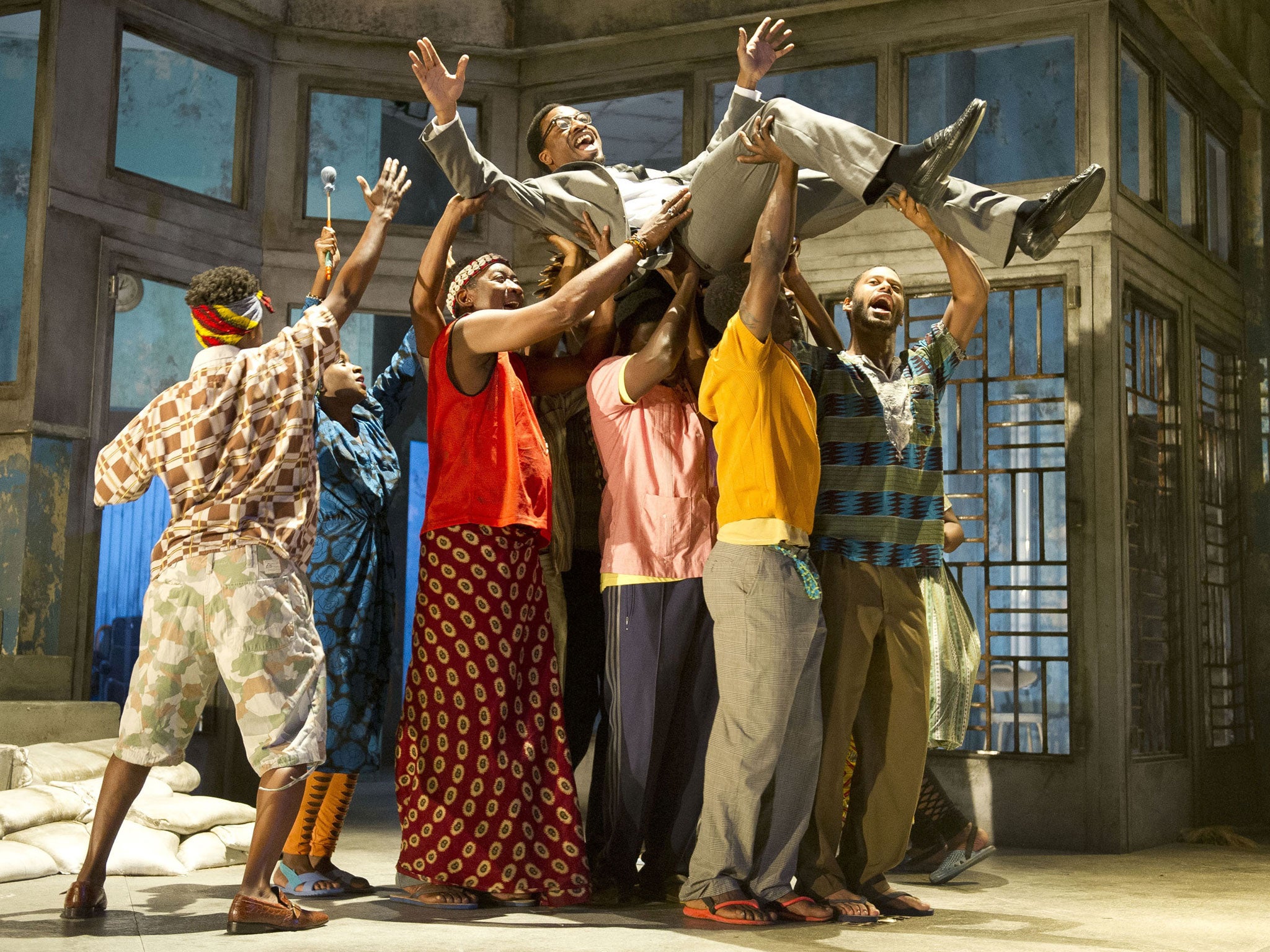Theatre review: A Season in the Congo - Doo-wop into the heart of darkness
Tribal conflicts and predatory bankers poison post-colonial ideals in a play that's taken 50 years to reach the British stage

Who can you trust? Leopold II, King of the Belgians, claimed he had intended to benefit Central Africa's tribes. In truth, he was a land-grabbing colonialist who, as the de facto sovereign of the Congo Free State from 1885, presided over forced labour and atrocities – prompting Joseph Conrad to pen Heart of Darkness.
A Season in the Congo – by the Caribbean writer and black politician Aimé Césaire – skips that backstory and zooms in on the Congolese independence movement, fermenting in the late 1950s.
In the Young Vic's spasmodically electrifying UK premiere – staged by film-turned-theatre director Joe Wright – Belgian troops patrol a Congolese market square. Here, a natty guy, in horn-rimmed glasses, is hawking beer to the locals, and to audience members seated at tables around the thrust stage.
The salesman is Patrice Lumumba (Chiwetel Ejiofor), stealthily transmogrifying into a revolutionary orator and leader of the MNC (Mouvement National Congolais). Turned into a humorous musical number, his pitch is accompanied by a doo-wop jingle, chorused by hip-wiggling chicks. But in the blink of an eye they transform into air-punching radicals.
The choreography, by Wright's co-director Sidi Larbi Cherkaoui, is vibrant. At one point, Lumumba hangs out in a bar where smooching couples slink and spin. Later, that same crowd is seen massacring each other in pulsating slow motion, as the new Democratic Republic of Congo spirals into a tribally divided bloodbath – to Lumumba's dismay.
The interwoven songs are also haunting, drawing on the Congolese music collated by Damon Albarn in 2011 (for the album Kinshasa One Two) – embracing ethnic ululations and folk ballads. A Season in the Congo thus adds to the Young Vic's already enticing strand of alternative musicals.
This production is hit and miss, nonetheless. Certainly, in the aftermath of the Arab Spring, the Congo's post-colonial troubles look topical again (albeit not wholly comparable). Though elected prime minister, Ejiofor's Lumumba is soon ousted in a military coup that the West doesn't halt, deeming him antipathetic to their interests.
The disappointment is that Césaire's script is uneven (in Ralph Manheim's translation from the French). Poetic and rudimentary by turns, it's narratively scrappy and, in some ways, seems dated (not incorporating recent claims about MI6 involvement in Lumumba's murder).
A Season in the Congo was written in the late Sixties, hence Wright throws in retro ingredients including Dario Fo-ish clowning (with the all-black cast playing whites with Commedia-style pink noses). That unfortunately falls flat, as do the vulture-like capitalists, embodied by puppets, like Sesame Street mutations. Theatrically, Wright isn't yet a safe pair of hands. But the bumpy ride is boldly free-wheeling, and Ejiofor's performance is terrifically taut, the idealistic fire changing to contained panic then transcendent dignity on the point of death.
In The Color Purple (Menier Chocolate Factory, London ***), an African-American woman, Celie, has to revolt against her own repressive menfolk. In this eventually feelgood musical – first staged on Broadway in 2005, based on Alice Walker's bestselling novel and the movie – Celie starts out as an intimidated walkover in early 20th-century Georgia. She has been raped by her stepfather and is treated like dirt by her whip-wielding husband, Albert – a descendant of plantation slaves.
In John Doyle's production at the Menier – with just wooden chairs on a long thrust stage – Cynthia Erivo's diminutive Celie endures domestic slavery with the patience of a saint. Then she gets mad at God (briefly); sees her stepson loving a feisty woman; and finds sapphic bliss in the kiss of Nicola Hughes's Shug Avery – the roving mistress of Christopher Colquhoun's Albert. Finally, Celie breaks free, telling him to go hang.
A big whoop for this feminist classic, especially when alarming numbers of today's teenage girls reportedly accept sexually abusive boys as "normal". Still, that doesn't stop this adaptation from feeling underpowered, with a plot boiled down to a fairy tale, 2-D villains, balletically twirling violence, not enough real rage, and too many pappy songs, despite their gospel and blues roots.
Last but not least, the immersive company Punchdrunk present another of their epic installations-cum-promenade shows in a disused warehouse in Paddington. The Drowned Man: a Hollywood Fable (31 London Street, Paddington ****) is a loose reworking of Buchner's fragmentary tragedy Woyzeck, translated to 1960s LA with studio starlets, leering cowboys, and the fatal love triangle refracted, with sexual inversions.
Spread across four storeys, the sets are a labyrinth of dark menace. Wander for hours through forests and sand dunes. Snoop around mouldering caravans (one with its rumpled bed growing moss). Sidle into mad voodoo chapels; or motel rooms littered with cryptic notes, where wirelesses have been left playing and vestiges of perfume hang in the air.
I've no idea who any of the flitting characters were and, annoyingly, couldn't see the climactic murder scenes due to overcrowding. En route, however, the actor-dancers – blurring rock'n'roll with vicious wrestling – are sharply disturbing.
'A Season in the Congo' to 17 Aug; 'The Color Purple' to 14 Sept; 'The Drowned Man' to 31 Dec
Critic's Choice
Last chance to catch Ciarán Hinds's superlative performance as the skint chancer in Conor McPherson's The Night Alive, at London's Donmar (to 27 July). Queue for the 20 cheap tickets released each morning. Meanwhile, Maxine Peake is at the Manchester International Festival today with a solo rendition of The Masque of Anarchy, Shelley's politically charged response to the anti-poverty demonstrators and Peterloo Massacre of 1819.
Subscribe to Independent Premium to bookmark this article
Want to bookmark your favourite articles and stories to read or reference later? Start your Independent Premium subscription today.

Join our commenting forum
Join thought-provoking conversations, follow other Independent readers and see their replies